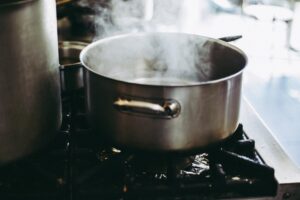
Photo by Michal Balog on Unsplash
There often has been a sense of respite in quarantine for some of us lucky enough to have remote jobs and children who get along in tight quarters. The period leading to Covid was rough, too, after all, and my self-assignments to see aspects of it sometimes seemed more like self-punishment.
“It’s not like I came down here looking for trouble,” I told a friend after one bloody event in Texas.
“Of course you went looking for trouble,” they said. “Who are you trying to kid?”
Quarantine did simplify my life to its most meaningful elements: spending time with family and friends (I have spoken daily by phone to my closest friend for more than 20 years but have seen him maybe four times), working, cooking, exercising, being outdoors, reading, and watching films. Sometimes I tried to remember what was so special about going out. In every place we have lived we eventually said, What is there to do in this town?
But one also has lain on one’s bed through the pandemic, in one’s own home, trying to work, definitely not hiding, while having the feeling that disaster could intrude at any moment: the email, the call about illness, the Tweet about some outrage performed in the name of the country to which one swore allegiance. The mob (figurative, for now) was always almost at the door, and one never knew who had the key.
All relationships seemed at risk, because all quibbles have been tinged with the threat of finality. People told me stories in anguish, then deleted the threads, embarrassed, but we all felt similarly. A father lost to TV propaganda made uneasy agreements with his family not to speak of politics, but everything is politics to him, so the distance grew vast. A husband ruined his marriage temporarily with ugly talk, if four or eight years is temporary enough to recover from. A friend responded to a message with non sequitur name-calling he got from the highest levels, as the movies say.
Now we are told we can drop our masks if not our guards. I am vaccinated, gratefully, but my fatigue is not cured. Despite some political normalization and easing of the pandemic in the US, our age still feels uncertain, prone to disaster, as if there is a pot on the stove no one is watching.
Yesterday I felt unprotected against the family coming out of the pizza joint next to the laundromat. Dad was speaking with someone inside the restaurant but choked on emotion.
“Never give in to terrorism,” he hissed. I thought it must have to do with Israel and Palestine, but he meant health precautions.
The world wants back in. Things are picking up. A guy I have not seen in years messaged yesterday to apologize, by proxy, for someone else’s bad behavior but equivocated and in the end blamed the wronged party.
A friend I do not see enough called unexpectedly to say I should most definitely get in a plane with our mutual friend who got a private pilot’s license. The pilot has been in recovery a long time, but back in the day I was with him when he got two of his DUIs. Even now he can set out on a 100-mile drive in his high-end SUV and have three things go wrong with it before he arrives. Is that bad luck? Long-sober, he giggles at the fantasy of flying through restricted airspace and seeing the look on F-16 pilots’ faces.
The thing about the world is that old and new are not layered, not side-by-side, but present. New guidelines do not mean just an opening to regular life, to ballgames and movie theaters and school. Like the Sixties, it is an age of with-me or against-me, for many, and getting out means, also, an opening to more conflict. The preferred thing is to go, obviously—go, go—but the prudent thing may be to go cautiously, cautiously, taking the temperature of the water in case it is rising without notice.
